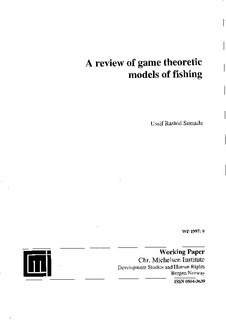| dc.description.abstract | Game theory is a formal tool for analysing strategic interaction between a finite number of agents. The fact that usually more than one entity or agent has property rights to fishery resources, has led to an explosion in the use of game theory and applications thereof to analyse fishery management problems. This review shows that game theoretic modelling has made significant contributions to our understanding of the problems of fishery resource management. However, many challenges still remain. For instance, models of straddling stocks are yet to be fully developed. In addition, fisheries economists have not yet fully exploited the opportunity provided by computational methods now available, and the ever increasing power of computers, to develop more empirical game theoretic models for practical fisheries management. | |
